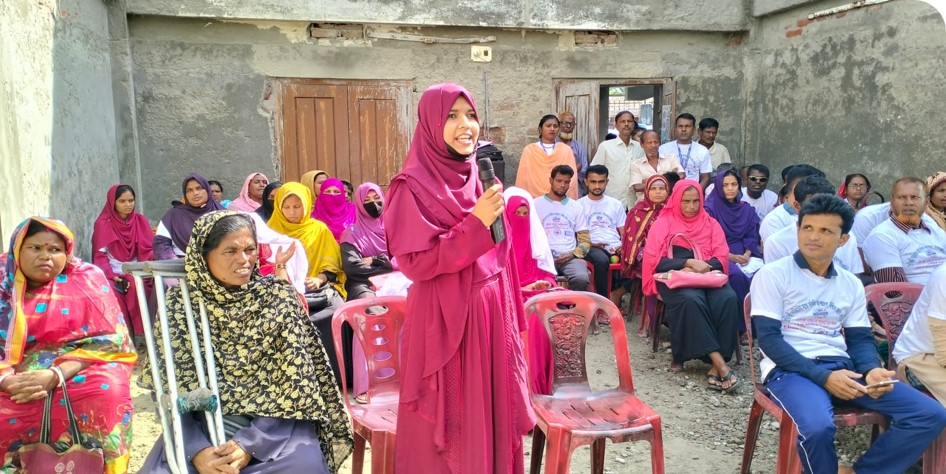World Mental Health Day: Improving Mental Wellbeing in the Workplace
News | October 10, 2024
What would you do if 1 in 4 of your colleagues are silently struggling with their mental health? As burnout and stress increasingly become the norm in workplaces, how can we, as employers and colleagues, prioritise mental wellbeing? This World Mental Health Day, it’s crucial to reflect on the role our workplaces play in supporting, or sometimes hindering, mental health.
This year’s theme for World Mental Health Day shines a light on mental wellbeing at work, calling on employers and employees alike to foster environments that promote wellbeing. After all, the workplace is where many of us spend the majority of our waking hours, making it a critical space for nurturing positive mental health.
The State of Mental Health in the Workplace
Mental health issues in the workplace are more prevalent than we often realise. According to the World Health Organization (WHO), an estimated 12 billion workdays are lost every year due to depression and anxiety alone, resulting in a staggering global economic loss. Employees across industries are facing rising rates of burnout, stress, and mental illness, all while navigating the ever-growing demands of work.
Recent studies reveal that nearly 70% of employees report feeling overwhelmed by their workloads, with many expressing concerns about the lack of mental health support from their employers. The pressure to be constantly productive, combined with the stigma surrounding mental health discussions at work, can make seeking help feel impossible.
According to the WHO Guidelines on Mental Health at Work, across the globe, technology, globalization, demographic shifts, emergencies, and climate change are reshaping how and where we work. It is acknowledged that the COVID-19 pandemic disrupted labour markets and accelerated the pace of change – especially in remote work, e-commerce, and automation. With some jobs being lost; while others are being created; almost all are changing. For many, these changes are creating new pressures or exacerbating existing stresses around work that have the potential to undermine workers’ mental health.
Why Mental Health Matters at Work
Mental health isn’t just a personal issue; it’s a workplace issue too. When employees are mentally well, they’re more likely to be productive, engaged, and satisfied in their roles. Conversely, when mental health suffers, so does job performance, attendance, and employee retention.
Organisations that take mental health seriously by creating supportive work environments often see a reduction in absenteeism, higher morale, and stronger loyalty among their employees. Research shows that businesses with robust mental health programmes report a 20% increase in employee retention rates.
Issues Faced by People with Lived Experience at Work
For individuals with lived experience of mental health disabilities, the workplace can often be a minefield of hidden obstacles. Many fear the stigma associated with mental health, leading them to remain silent about their struggles. This silence can result in feelings of isolation, as employees may worry that disclosing their mental health condition will lead to discrimination, judgement, or even jeopardise their career advancement.
Dorothy Nakato Mubezi, Executive Director of Uganda National Self-Advocacy Initiative (UNSAI), says: “We face several barriers in access to employment in the open labor market that include attitudinal barriers related to mental illness, lack of supports in case of crisis, social stigma and discrimination including denial of reasonable accommodation being an invisible disability.”
Practical Tips for Promoting Mental Health in the Workplace
Creating a mentally healthy workplace doesn’t have to be complicated. Here are a few practical steps that both employers and employees can take to promote mental well-being:
- Encourage Open Conversations: Normalise talking about mental health by creating safe spaces for dialogue. Leaders should lead by example by being open about their mental well-being.
- Provide Access to Mental Health Resources: Employers should offer mental health benefits such as counselling services, Employee Assistance Programmes (EAPs), or access to mental health apps.
- Flexible Working Hours: Allowing flexibility in work hours or remote work can help employees manage stress, especially for those balancing family or personal challenges.
- Workplace Initiatives: Consider implementing initiatives like “Mental Health Days,” mindfulness workshops, or even mental health first aid training for managers.
Binod Sah, Project Manager of KOSHISH Nepal, says: “We have been practicing open discussions…to establish mental well-being in the workplace.”
Abhas Dangol, Senior Programme Manager of KOSHISH Nepal, adds: “We recognise and appreciate our employees’ performance and contributions and provide reasonable accommodations for colleagues with disabilities as well as additional support for all colleagues as required.”
Indeed, the Global Report on Health Equity for Persons with Disabilities (2022) notes that in the workplace, it has been shown that even the smallest accommodations such as buying equipment and changing work schedules lead to substantial benefits for both persons with disabilities and employers.
A Call to Action
This World Mental Health Day let’s commit to making mental health a priority in our workplaces. Whether you’re a manager, an HR professional, a colleague, or a person with lived experience of a disability, everyone can contribute to fostering a supportive work environment.
Start small. Check in with your colleagues, advocate for flexible work policies, or encourage your organisation to invest in mental health resources.
Paul Wanjiru, HR Assistant of CBM Global, says: “We have invested in making sure staff have resources that they can access whenever they require mental wellness support.”
By taking these steps, we can build healthier, more productive work environments that empower individuals to thrive both professionally and personally.
Angelica Mkorongo, Board Member of the Pan African Network for Persons with Psychosocial Disabilities (PANPPD), says: “Prioritising mental health in the workplace is essential. We must implement policies and practices that support mental wellbeing, provide resources for those in need, and foster a culture where everyone feels valued and understood. Creating a supportive atmosphere where employees feel safe to seek help and receive the necessary support is vital. Together, we can break the stigma and make a significant difference by prioritising mental health in our workplaces.”
Rose Umutesi, Chairperson of PANPPD, adds “Leadership plays a crucial role in modeling these values and driving sustainable change. In today’s fast-paced world, mental health challenges are becoming more prevalent. Promoting a balanced work environment that encourages productivity and well-being is essential.”
https://cbm-global.org/news/world-mental-health-day-2024
Related News

One in Five Is Not Enough: The gains on Disability Inclusion have not gone far enough
One in Five Is Not Enough: The gains on...

COP30 Is a Turning Point for Disability-Inclusive Climate Action
As the world gathers in Belém, Brazil, from 10–21 November 2025 for COP30, the message from...

Achieving resilience for all requires funding disability inclusion in DRR
On International Day for Disaster Risk Reduction (DRR) 2025,...
